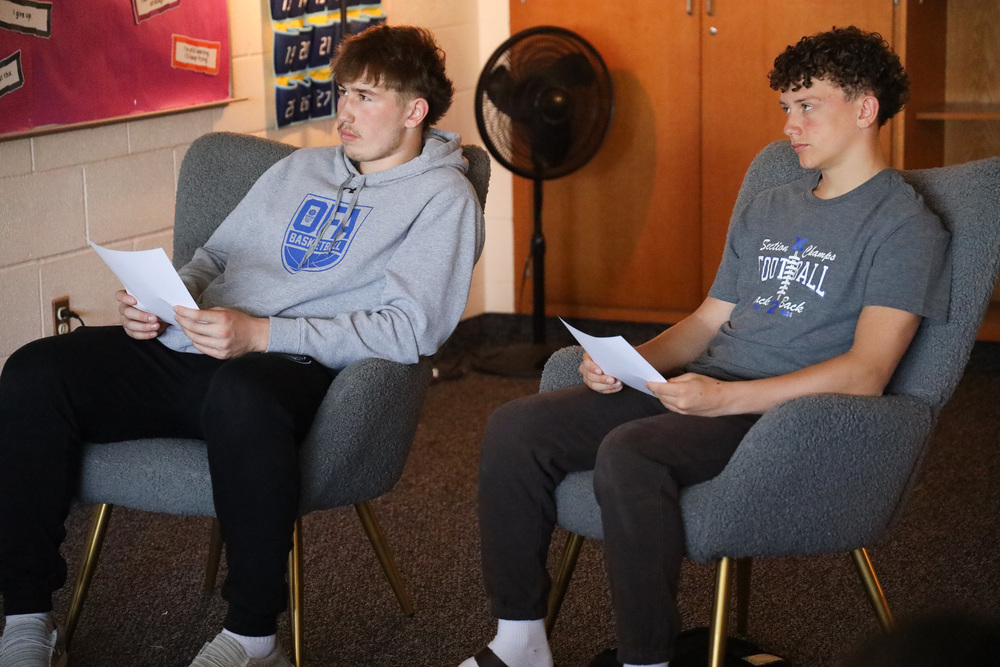Mr. Greg Hooper and Mrs. Andee West, dedicated school social workers at OFA, are the teachers behind the Science of Well-Being class. This elective empowers students to reframe their thoughts, fostering a more fulfilling and happy life not only for themselves but also for those around them.
Throughout the semester, students explore six dynamic modules during the class. This experiential course encourages active participation through group discussions and hands-on activities, helping students to grasp and apply key concepts. Mr. Hooper arranges the classroom chairs in a circle to build community and deepen understanding. All content is backed by research, ensuring students learn material that is both relevant and applicable.
“The best thing about this class is that we can discuss all of this amongst ourselves,” said Mia, a student. “It’s not just a lecture.”
The course delves into psychological strategies essential to well-being. Mr. Hooper and Mrs. West bring these concepts to life with real-world examples, making them easy to understand and apply. By embracing positive psychology, students learn valuable skills to enhance their happiness.
 Ian discussed the “feel good, do good” phenomenon, which highlights how helping others can boost personal well-being. Contrary to the belief that focusing on happiness is selfish, feeling good often leads to spreading joy to others.
Ian discussed the “feel good, do good” phenomenon, which highlights how helping others can boost personal well-being. Contrary to the belief that focusing on happiness is selfish, feeling good often leads to spreading joy to others.
Intrinsic happiness isn’t about comparison or material possessions. It’s about discovering gratitude through relationships and meaningful experiences.
Other topics covered include savoring, affective forecasting, impact bias, negative visualization, and social comparison. For a culminating project worth 30% of their grade, students create poster board presentations on a topic of their choice. At the end of the year, they display their work in the classroom and invite faculty to explore it in a relaxed, informal setting.
Mr. Hooper and Mrs. West explain that just like the physical immune system, there’s a psychological immune system that helps manage emotions. Emotional wounds, like physical ones, heal over time. One valuable strategy is savoring, being present and fully enjoying the moment to enhance well-being.

In one classroom experiment, students explored savoring using Life Saver candies. They first held the candies, then slowly tasted them, focusing on the experience. This exercise helped combat hedonic adaptation and appreciate life’s simple pleasures.
Ian shared another example: at concerts people often record with their phones instead of being present. He encourages others to put their phones away and enjoy the moment.
Mr. Hooper and Mrs. West supplement lessons with YouTube videos and occasionally show the film “The Peaceful Warrior,” which ties together course concepts.
The goal of the class is to help students understand that many things believed to bring happiness often don’t. By learning and applying key principles, research shows that baseline happiness can be boosted. Whether facing challenges or enjoying success, students learn how to bounce back more quickly.
 Several students told Mr. Hooper and Mrs. West the class taught them the value of patience. They’ve learned not to react immediately to every situation. Waiting often leads to better outcomes.
Several students told Mr. Hooper and Mrs. West the class taught them the value of patience. They’ve learned not to react immediately to every situation. Waiting often leads to better outcomes.
Mia shared that she uses these concepts without realizing it. After losing a hockey game, she was upset, but over time, the feelings faded. Mr. Hooper and Mrs. West explain that emotional intensity diminishes, and the psychological immune system helps with recovery. Mia also noted that being sick reminds her to appreciate simple things, like breathing through her nose when healthy.
Ian and Urijah, varsity basketball players, faced tough playoff losses. The boys team lost to Canton by one point. Ian said the locker room was quiet afterward. When Mr. Hooper asked how he felt later, Ian replied, “We know what we have to do next year to get to that position again.” The experience reinforced the idea that time heals.
Areanna has worked with Mr. Hooper since seventh grade, before the class existed. She said the course is now a crucial resource for students who feel they have nowhere else to turn. She continues to use the strategies Mr. Hooper taught her to overcome obstacles to happiness.
Affective forecasting often leads to overestimating emotional responses. Students learn to think differently and shield themselves from unnecessary stress. “Most students don’t have that optimistic attitude,” Mr. Hooper said. “By the time we’re done with this course, the hope is that everyone will.”

